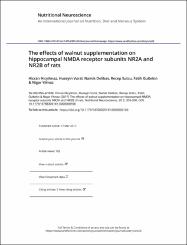The effects of walnut supplementation on hippocampal NMDA receptor subunits NR2A and NR2B of rats
Abstract
Objectives: Walnuts contain numerous selected dietary factors that have an impact on brain functions, especially learning and memory formation in the hippocampus. Hippocampal N-methyl D-aspartate receptors (NMDARs) are involved in the formation of cognitive functions. In this study, we aimed to investigate the molecular effects of walnut supplementation on the hippocampal expressions of NMDARs involved in cognitive functions and lipid peroxidation levels in rats. Methods: The male Sprague-Dawley rats (6 months old, n = 24) were fed with a walnut-supplemented diet (6% walnut diet, n = 12) and a control diet (rat food, n = 12) as ad libitum for 8 weeks. At the end of this period, NMDAR subunits NR2A and NR2B in the hippocampi were assayed by western blotting. Lipid peroxidation levels were measured using the thiobarbituric acid. Results: The expression of NR2A and NR2B was elevated in the walnut-supplemented rats compared with the control group (P < 0.05). In addition, the levels of lipid peroxidation in the walnut-supplemented group were significantly decreased compared with the control group. Discussion: We suggested that walnut supplementation may have protective effects against the decline of cognitive functions by regulating NMDAR and lipid peroxidation levels in the hippocampus. The study provides evidence that selected dietary factors (polyunsaturated fatty acids, melatonin, vitamin E, and flavonoids) within walnut may help to trigger hippocampal neuronal signal transduction for the formation of learning and memory.


















